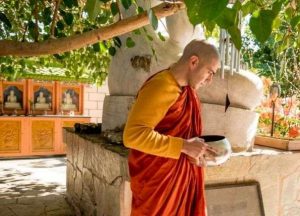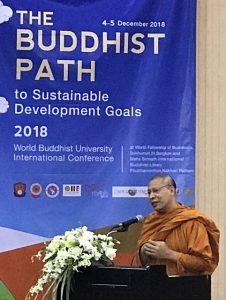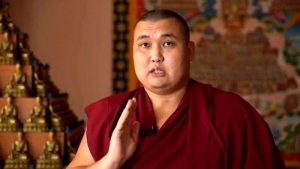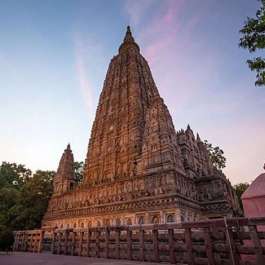In ancient Chinese literature, “the West” refers to India—the birthplace of Buddhism. Nowadays, as in most cultures across the globe, the West for the Chinese points to North America and Europe.
Venerable Guan Zhen (冠振) represents the new generation of Chinese Buddhist sangha members who speak English and teach the Buddhadharma in the West. He was ordained as a Chan Buddhist monastic in 2001 and subsequently completed his BA in Buddhist Studies at the Buddhist Academy of China in 2005 and earned a Master of Divinity in Buddhist Chaplaincy at the University of the West in California in 2013. Currently, he is pursuing his second master’s degree in Social Work at Columbia University in New York City. Besides his impressive academic record, Ven. Guan Zhen also served two and a half years in the US Army Chaplain Corps, becoming the first Chinese Buddhist monk to serve men and women in uniform in the United States.
For this article, I had the great pleasure to interview Venerable Guan Zhen and learn about his experiences in the US and his insights on Chinese Buddhism today.

Image courtesy of Venerable Guan Zhen.
Buddhistdoor Global: Ven. Guan Zhen, could you please tell us about your background first? How and why did you join the monastic sangha in China and what brought you to the US?
Ven. Guan Zhen: Ms. Zhang, thank you so much for having me. I have been exposed to Buddhism since I was a child. My mother’s younger brother became a Buddhist monastic in the year when I was born. I still remember when I was little my mother would take me with her to visit my uncle at different Buddhist temples. My mother would also send me to stay in local monasteries during my summer breaks. To be honest, I was just trying to make my mother happy at the time, and I never thought that I would someday become a monastic myself. It was not until April 1999 that I felt a call from the depths of my heart to become a Buddhist monastic. I went on to receive full ordination as a qualified bhikshu in 2001, and completed a four-year Buddhist Studies degree at the Buddhist Academy of China in Beijing. In July 2005, I moved to Los Angeles and worked for the Southern California Chinese Buddhist Association.
BDG: I personally know several Chinese Buddhist monastics who are pursing or have completed their graduate studies overseas. It seems quite natural that most of them continued with Buddhist Studies. What made you decide to major in Social Work at Columbia University? You are currently doing an internship in the Department for the Aging at the Office of the Mayor of New York City. Could you please tell us more about that?
VGZ: Right, I agree. It might be natural or even expected by some that a Buddhist monastic should continue his or her studies in Buddhism overseas, so that he or she may later become an expert in the field of Buddhist Studies. However, I could not perceive that kind of potential in myself. Also, I seek more to understand and engage in society rather than to become a Buddhist scholar. I am interested in how Chinese Buddhism may join the rest of the world and shape society with its core values of compassion and wisdom, and with its morality and spirituality in practice. This is the main reason why, in 2015, I decided to pursue a degree at the Columbia School of Social Work (CSSW) after years of working in the field of Buddhist ministry and chaplaincy. In studying Social Work, my research interests have been concentrated on contemporary social issues. So far, my studies at CSSW have broadened my horizon on those issues and enhanced my practices as a spiritual caregiver. My current internship at the mayor’s office is mainly about researching mental health issues among Chinese seniors in New York. It might not sound very relevant to my role as a Buddhist minister or chaplain, but it does lead toward the same direction in which I have been working as a spiritual caregiver in society.

BDG: In February 2012, you were commissioned as a second lieutenant in the U.S. Army Chaplain Candidate program. In 2014, you were promoted to first lieutenant and served at the United States Military Academy at West Point. What responsibilities did you have there? How did you find the transition from university to the military?
VGZ: My responsibility at West Point was to provide religious support and spiritual care for new cadets, along with chaplains of other religious traditions there. For me, moving from a university to the military was indeed a great transformation. My experience is that university life is much more flexible, relaxing, and less disciplined. Military life, on the other hand, demands that a person live with strict discipline, integrity, and responsibility—especially commissioned officers. I believe it was a privilege and an honor to serve in the US military, taking care of men and women in the uniformed services. It not only enriched my life as an individual, but also allowed me to better understand myself as a priest, a reliable friend, a trustworthy person, and a spiritual caregiver. I also learned that leadership is in fact servant-ship. In the military, officers always make sure their soldiers are well taken care of before they even think about themselves. This kind of leadership has inspired the way I serve others in society.
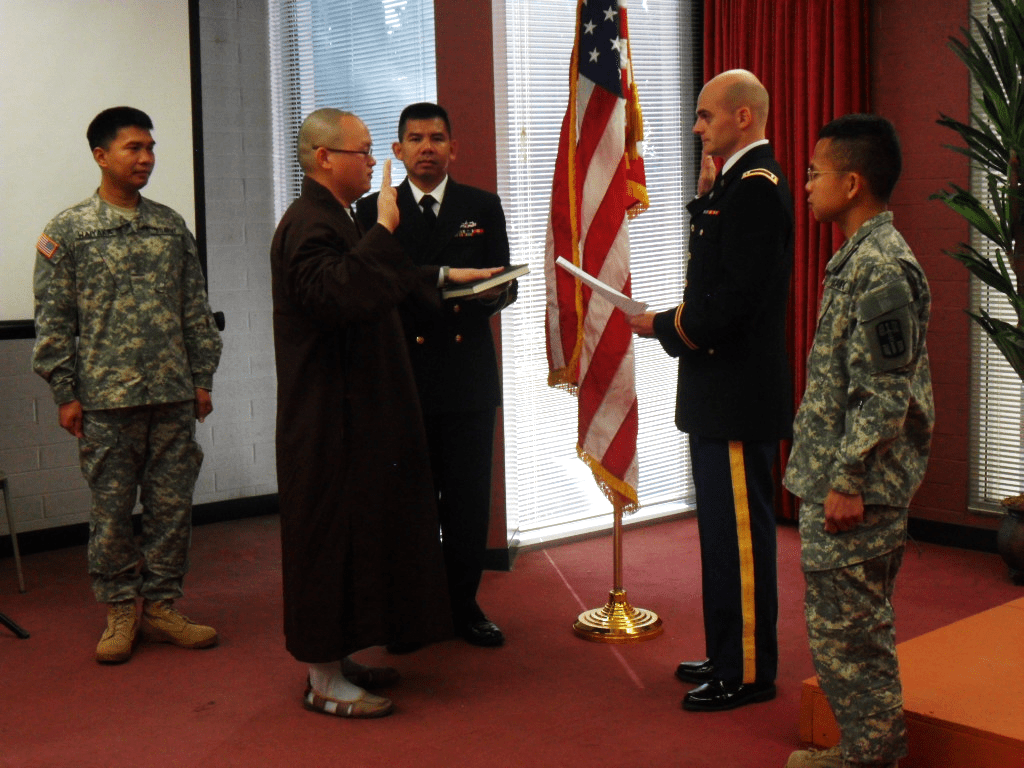
BDG: Drawing on your international experiences with the Buddhist sangha, academia, and governmental institutions, how do you see the role of Chinese Buddhism in American society today?
VGZ: To answer your question, I think I should first mention that people from outside the US tend to think that Americans are self-centered, or that individualism is the mainstream value of American culture. This is true, but it is also not true. I could be wrong, but my shallow observation tells me that Americans might be self-centered in terms of pursuing individual success, but they also strive hard to care for others and to promote social justice for all. To me, Americans are good people who not only care for themselves, but also care for social justice. They care about how society develops in a healthy way, treating each individual fairly and justly. Americans speak out for those who are vulnerable in society and will seek social justice for those who are mistreated. Going back to your question, I see a common ground between Chinese Buddhism and American culture. When the two are joined together, social justice can be better achieved with wisdom and compassion. I used to tell my friends that Buddhism is like water. Wherever it goes, it brings life, justice, hope, and harmony. Engaging Buddhism with a specific society is the key, so that these Buddhist values can be brought forward to benefit the masses.
BDG: Compared with Theravada Buddhism and Tibetan Buddhism, Chinese Buddhism seems to be much less understood and recognized on a global level. In your view, what are the reasons?
VGZ: Personally, I have almost zero knowledge of Theravada Buddhism or of Tibetan Buddhism, but I do notice that both of them are very successful in transmitting the Buddhadharma and benefitting people in the West. I am not sure whether or not Chinese Buddhism has been less understood or recognized on a global level, but I do think that there are reasons that may have made Chinese Buddhism less visible in the US. First, to me Chinese Buddhism in the US tends to serve only the Chinese community. Second, Chinese Buddhism is somewhat conservative in nature and perhaps even resistant to change and innovation in the contemporary world. Lastly, it seems to me—at least so far—that Chinese Buddhism in the US has not taken enough initiatives to embrace American culture and engage in society, as other Buddhist traditions (such as Tibetan and Japanese Buddhism) have done.
BDG: You take a very enterprising and creative approach to your role as a sangha member. What are your future plans?
VGZ: Thank you so much, Ms. Zhang! I am not sure whether I am taking an enterprising and creative approach or not in this country at this point. I think that, as a Buddhist minister, what I have been doing is natural. I mean, I have been living and studying in the US for over a decade. What I am doing now, or trying to do, is a reflection of the environment I am in and of the people I interact with. My future plans? Well, I just want to continue my life as a simple Buddhist monk and do whatever I can to humbly serve others.

Angeles National Forest in the San Gabriel Mountains, California.
Image courtesy of Venerable Guan Zhen









